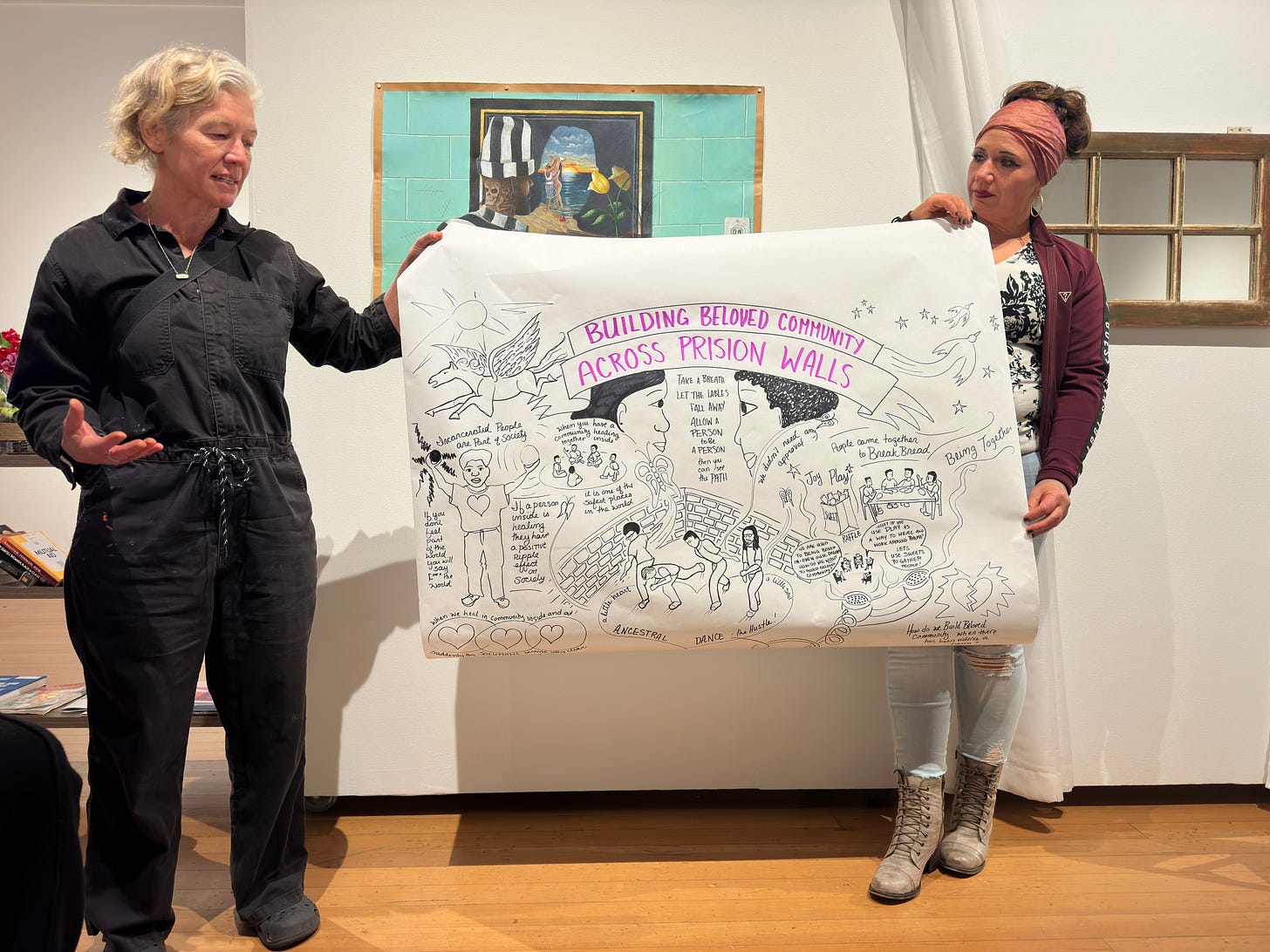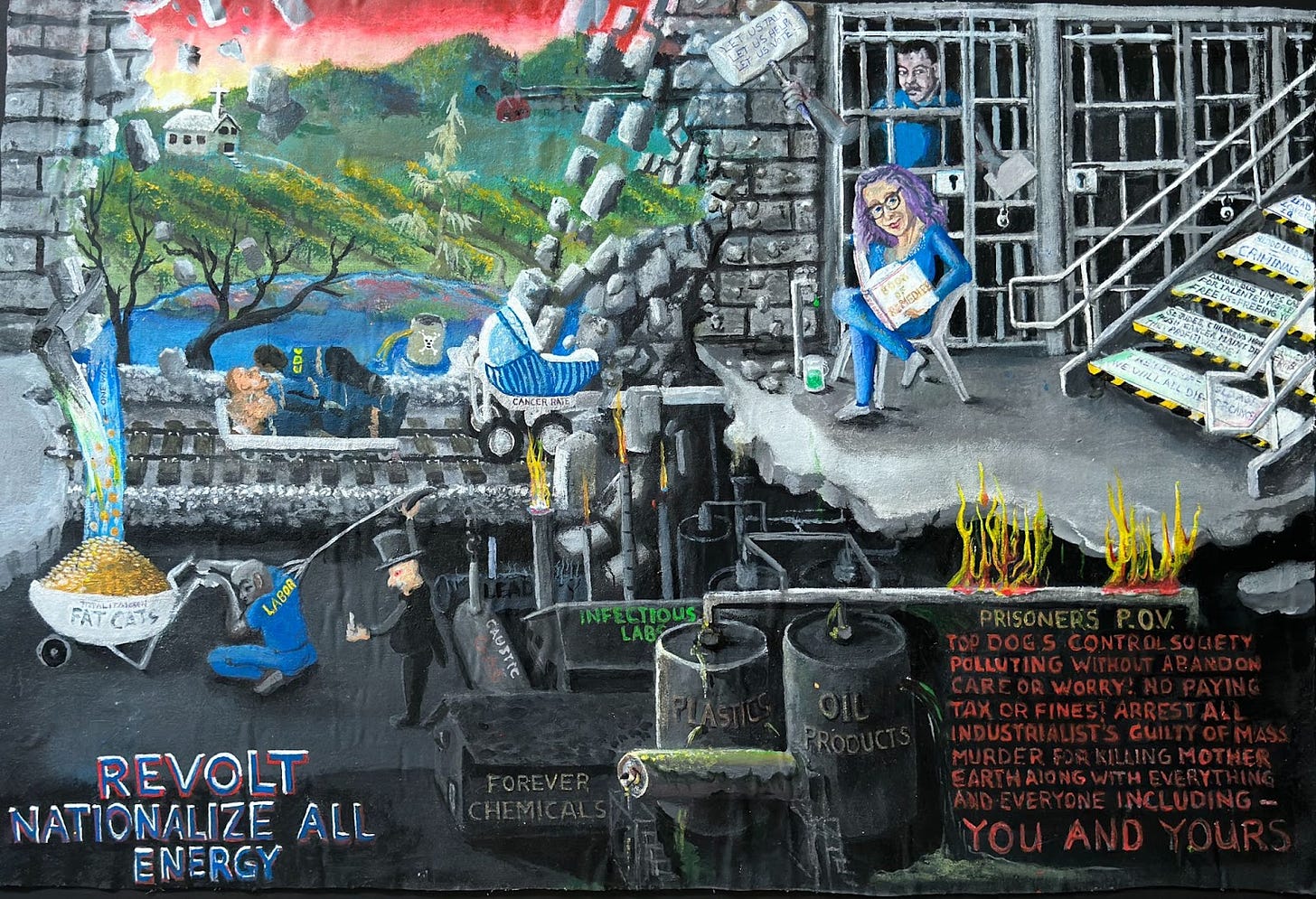Welcome to Empowerment Ave! Learn more about our history, partnerships, and past published work here. Subscribe to the newsletter here.
This Saturday, November 2nd, we launched our project Building Beloved Communities Across Prison Walls at our current Berkeley Art Center exhibit, Painting Ourselves Into Society. Two Empowerment Avenue leaders shared Beloved Community projects we’ve collaborated on over the course of the year, followed by community discussions on creating safety and belonging for all. The event featured a call from EA artist Alvin Smith, currently in prison, and a live Zoom session with EA writer Kunylna Tauch, recently returned home. We confronted complex questions about maintaining safety and belonging, even when harm occurs. Thank you to everyone who joined the conversation and danced in solidarity with the men incarcerated alongside Alvin.
We were also thrilled to host Cedar Annenkovna, an EA artist who is now home and got to see her work displayed on the Berkeley Art Center walls. (She is pictured above, at right, with Kristen Lynn Zimmerman of the Beloved Communities Network.) You can support Cedar’s homecoming by donating to her Gofundme.
As always, EA writers published work covering a variety of topics. We are proud so many EA writers contributed to the 2024 election coverage, including op-eds about restoring the right to vote, election opinions from folks in Washington and Texas prisons, and what happened when San Quentin held a mock election. Please read, vote tomorrow if you are able, and help us elevate stories and awareness of the people in prison left out of our democratic process.
Our Latest Work
Some thoughts on dying in prison, by Tony Vick for Filter Mag1. "James and Gary, incarcerated with me at South Central Correctional Facility, will soon die of cancer. Both had end-of-life thoughts they wanted to share. As someone who will one day die in prison myself, I wanted to listen."
What fantasy football means to incarcerated managers, by Antoine Davis for Defector2. “…for those of us behind bars, fantasy football involves a specific kind of nostalgia, reminding us of the bonding experiences we shared with family and friends before prison".”
For The Nation3, Christopher Blackwell and Emily Nonko teamed up to write about the beginnings of Empowerment Avenue’s writing cohort and why we need journalism from prison now, more than ever. “We view this work not just as journalism but as educational, positive, and empowering to everyone involved.”
Evident Change’s4 “behind the scenes” blog for the Media for a Just Society Awards features a conversation between Christopher Blackwell and his writing partner Mari Cohen. They talk about bringing stories of solitary confinement into public spaces.
For The Appeal5, Christopher Blackwell writes about the campaign to free the Mississippi Five, and Corey Devon Arthur provides a powerful illustration (below).
For The Progressive6, Kevin Light-Roth reports on how a Republican victory this election season could escalate mass incarceration. “For those of us who are directly impacted by the prison system, the 2024 elections threaten every aspect of daily life, and even life itself."
Our partnership with Black Lipstick continues to highlight stories from women and queer folks who are incarcerated. Xandan Gulley writes about the hidden truth of solitary in Texas prisons, in his essay 12 Years Hostage.
Kwaneta Harris wrote for Reckon News7 on how restoring the right for incarcerated people to vote would make for a safer, healthier democracy. “People in this country have a long history of fearing the other. I wonder what people might fear about currently and formerly incarcerated people voting?”
Elizabeth Hawes has a feature about the pervasive practice of strip searches in women's prisons for the latest issue of Lux Magazine8. “I’ve spent the past year talking with incarcerated women about one of the worst indignities we face: the constant use of random urine analysis tests (UA) and strip searches. It happens to all of us. It happens to me,” she writes.
For his latest International Examiner9 column On The Fence Line, Felix Sitthivong contemplates the upcoming election: "We’ve been duped into playing this two-party political game for so long that many of us can’t even imagine anything different."
Robert Lee Williams writes about the power of suggestion for Freedom Reads: "I then imagined the culture and community that would be created if a Freedom Reads Library was installed inside my cellblock in Sullivan."
For The Guardian10, For San Quentin reporter Juan Moreno Haines teamed up with journalist Sam Levin to report on a mock election held inside the prison. “…dozens stopped by the prison’s education department and slid paper ballots into a locked metal box with an American flag and the word “vote” painted on it.” (ABC also covered it.)
Peripheries: A Journal of Word, Image, and Sound11, has its sixth issue out in print, and EA poet P.M. Dunne is featured! Order a copy here, from Harvard University Press.
Texas prisoners with mental illness are held in phone booth–sized, feces-covered cages for days on end. Incarcerated journalist Jeremy Busby experienced it firsthand and reported on it for Slate12, supported by the Ridgeway Reporting Project.
Carla Simmons shares how women who never committed crimes are arrested, for The Appeal: "In Georgia, a person can be charged as a “party to a crime” for simple acts like answering a phone or loaning gas money. [Woman are] trapped in prison for crimes committed by men or abusive partners."
Ryan Moser has a powerful op-ed up with the Philly Inquirer about what it means to cast a vote after coming home from prison. And he also wrote for Resolve Philly13 about the fight to restore his voting rights. "When I walked out of the Everglades Correctional Institution in Florida two years ago a free man, I had no idea that my voting rights could be restored."
Aaron Kinzer’s writing was featured in SpeakUpSis! Magazine14 about the joys and pains of fatherhood. "Fatherhood is a journey of self-discovery, where one learns to navigate the unchartered waters of nurturing a young man for an unforgiving world."
Just because most people in prison can’t vote doesn’t mean they aren’t closely watching the 2024 election. Kwaneta Harris and Christopher Blackwell share with The Appeal what they want candidates to know.
Artist Spotlight: Joanna Nixon
We had the fortune of being introduced to artist Joanna Nixon, by our friends at A.B.O. Comix. She’s an incredibly prolific and resourceful artist wo currently has four artworks included in our exhibition Painting Ourselves into Society. She creates her own canvas using prison sheets and even made her own homemade gesso.
This painting, Arrest THEM for Killing Mother Earth, depicts the shared impacts between the free world and prison. Joanna says, “The top dogs who are controlling society pollute without abandon or care. They knowingly are killing the Earth and her inhabitants, without worrying about paying taxes or fines. We who are now on mental health behavior modification, see ourselves as able and uniquely useful. We had problems making society suffer, now we have solutions…We need to expose, arrest and hold those accountable for killing you all and Mother Earth!”
Inside/Outside Insights
CONGRATS: Christopher Blackwell, Antoine Davis, Aaron Olson, Raymond Williams, Jonathan Kirkpatrick, and Hector Ortiz—all EA writers—won the 2024 Evident Change for a Just Society Award.
VOTE: Kunlyna Tauch was featured in this NPR article about the meaning of voting for the first time, after coming home from prison.
FILM FESTIVAL: Our founder Rahsaan Thomas hosted the successful San Quentin Film Festival, the first-ever film festival to be held inside a prison. It was covered by the New York Times, San Francisco Chronicle, Mercury News, and other publications.
Want to connect with us more?
Follow us on Twitter and Instagram | Donate to our work here | Learn more on our website here | Build with us at empowermentave@gmail.com
Filter’s mission is to advocate through journalism for rational and compassionate approaches to drug use, drug policy, and human rights. They pay $300 per essay.
Defector is a new sports blog and media company. They pay $500 for an article.
The Nation is a progressive American monthly magazine that covers political and cultural news, opinion, and analysis. They paid $300 for this op-ed.
Evident Change, formerly the National Council on Crime & Delinquency and the Children’s Research Center, is a nonprofit that uses data and research to improve our social systems.
The Appeal covers criminal justice issues from a progressive lens and pays $1/word.
The Progressive champions grassroots progressive politics, civil liberties, human rights, economic justice, a healthy environment, and a reinvigorated democracy. They pay $150 for op-eds.
Reckon is an award-winning national news organization covering people powering change, challenges shaping our time, and what it means for all of us.
Lux Magazine is a new magazine of socialist feminism. “It's sex, with class.”
International Examiner is a Seattle publication focusing on the Asian-American experience. They pay $100 for essays.
Latest US news, world news, sports, business, opinion, analysis and reviews from the Guardian, the world's leading liberal voice. They pay roughly 65 cents per word.
Peripheries, No. 6, spans the senses with music, choreography, painting, sculpture, archival material, short stories, and poetry.
Slate is an online magazine that covers current affairs, politics, and culture in the United States. They pay around $400 for online stories.
Resolve Philly is a nonprofit newsroom that demonstrates how news can better serve communities when rooted in solutions and community voices.
SpeakUpSis! Magazine is a quarterly periodical created for women whose voices are quieted because they are busy rearing children, caring for aging parents, etc.





